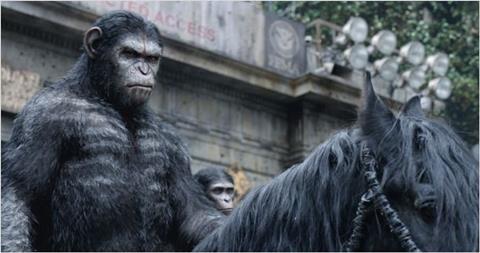Dir: Matt Reeves. US. 2014. 130mins

The sequel to sci-fi franchise reboot Rise Of The Planet of the Apes is heavier on ape-vs-human action than its predecessor and lighter on the kind of intimate drama that three years ago made the reboot a surprisingly affecting late summer hit. As such, the relatively generic Dawn Of The Planet Of The Apes is less emotionally resonant than Rise but possibly better equipped - especially with the addition of 3D - to fill its role as a midsummer box office earner aimed particularly at the international market.
The motion capture technique employed to make Caesar a believable and sympathetic character in Rise is used more extensively in Dawn to give a number of the ape characters identifiable personalities.
Worldwide distributor Fox opens Dawn in North America on July 11 - between the latest Transformers and the new Hercules - and the release slot should help the film at least match Rise’s $176.8m domestic take. In the international arena - where it was unveiled this weekend at the Moscow International Film Festival - Dawn might, thanks to 3D, the action emphasis and an internationally flavoured cast, surpass Rise’s impressive $305m tally.
The script, by Mark Bomback (The Wolverine) and Rise writers Rick Jaffa and Amanda Silver, picks up the story more than a decade after the end of the earlier film. While most of the human race has been wiped out by a simian flu virus, Caesar (once again played, with the help of motion capture technology, by Andy Serkis) and his fellow genetically evolved apes have made a secluded home in the Northern California forest.
They’re not yet as sophisticated as the title characters in the 1968 franchise original, but they have learned to ride horses, construct shelters and, in a few cases, speak.
The trouble starts when a group of human survivors shows up looking for a forest dam that could provide power for a San Francisco encampment. Both apes and humans are divided about the others’ intentions and the mistrust leads the two sides into a battle that itself leads to the brink of all out war (a war that will presumably be fought in the next Apes film, already announced for 2016).
Heroes and villains are provided on both sides - the human versions being enlightened dad Malcolm (played by Australian Jason Clarke, from The Great Gatsby) and unenlightened camp boss Dreyfus (the UK’s Gary Oldman) - and the film draws parallels between the lead characters’ ape and human families. But none of the characters are very memorable and the allusions to issues such as ecology and racism are too vague to have much impact.
Rather than developing those angles, director Matt Reeves (Cloverfield) takes the film down familiar genre paths - previously trodden by Westerns, gangster films and zombie flicks - that provide few dramatic surprises.
The motion capture technique employed to make Caesar a believable and sympathetic character in Rise is used more extensively in Dawn to give a number of the ape characters identifiable personalities. The technology is more refined this time out, but it sometimes has the effect of making the apes seem too human.
The 3D is subtle to a fault, only becoming noticeable during the action sequences that dominate the final third of the two-hour-plus running time.
Production companies: 20th Century Fox, Chernin Entertainment
International distribution: 20th Century Fox
Producers: Peter Chernin, Dylan Clark
Executive producer: Thomas M Hammel
Screenplay: Rick Jaffa, Amanda Silver, Mark Bomback
Cinematography: Michael Seresin
Editors: William Hoy, Stan Salfas
Production designer: James Chinlund
Music: Michael Giacchino
Website: www.dawnofapes.com
Main cast: Andy Serkis, Jason Clarke, Gary Oldman, Keri Russell, Toby Kebbell, Kodi Smit-McPhee






![The Brightest SunScreen[Courtesy HKIFF]](https://d1nslcd7m2225b.cloudfront.net/Pictures/274x183/3/5/0/1448350_thebrightestsunscreencourtesyhkiff_312678.jpg)














